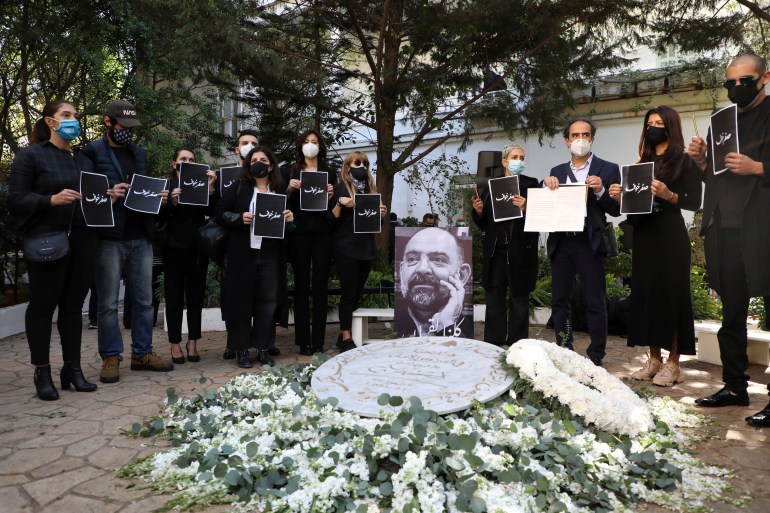Lebanon: The assassination of activist Lokman Slim, one year on | Hezbollah News
Lebanese activist and Hezbollah critic Lokman Slim was found dead in his car last year, and his family is still awaiting accountability.
Beirut, Lebanon – A year after the assassination of the activist and Hezbollah critic Lokman Slim, his family is still waiting for accountability.
“The investigation is ongoing, but unfortunately one year after, nobody has been accused, and nobody has been arrested,” his widow, German filmmaker Monika Borgmann, told Al Jazeera.
“The investigation is now taking place in Beirut, and I have attended two hearings with a judge.”
Slim went missing one year ago after visiting a friend in the southern Lebanese town of Niha. He was found dead the following morning in a black Toyota rental car on a quiet road between two villages in the region.
He had been shot five times in the head, and once in the back. Borgmann confirmed several days later that there were no signs of torture following an autopsy.
Human Rights Watch said in a new report on Thursday that local investigations into the assassinations of Lokman Slim and three other “politically sensitive murder investigations” have failed, and questioned the impartiality of Lebanese law enforcement.
Aya Majzoub, Human Rights Watch Lebanon researcher, told Al Jazeera that the investigation into Slim’s assassination was “riddled with procedural violations”.
“Unfortunately, we have come to expect little progress on politically sensitive murder investigations,” Majzoub says.
“For decades, the killers of journalists, politicians, and activists have gone unpunished, perpetuating the culture of impunity, and allowing these heinous crimes to continue.”
 Activists hold up pieces of paper with the words in Arabic ‘zero fear’ during the memorial service to pay tribute to Lokman Slim, a Shia publisher and activist who was found dead in his car, in Beirut, Lebanon [File: Mohamed Azakir/Reuters]
Activists hold up pieces of paper with the words in Arabic ‘zero fear’ during the memorial service to pay tribute to Lokman Slim, a Shia publisher and activist who was found dead in his car, in Beirut, Lebanon [File: Mohamed Azakir/Reuters]Lokman Slim is remembered as a political analyst, activist, and intellectual. Slim co-founded UMAM Documentation and Research in 2005, a non-profit that most notably included an extensive historical archive and a cultural and exhibition space called the Hangar, and civic organisation Hayya Binna (Let’s Go).
Slim’s family has launched a photography exhibition at the Hangar to honour Slim’s legacy.
“The whole Hangar is now dedicated to Lokman,” Borgmann told Al Jazeera.
Slim was also one of the most outspoken Shia critics against Iran-backed Hezbollah. In one of his last media appearances, he said Hezbollah and the Syrian government were linked to the explosive material that caused the Beirut Port explosion in August 2020.
Borgmann said Hezbollah had threatened Slim several times before the assassination. In December 2019, Hezbollah supporters plastered posters on the walls outside his home in the southern suburbs of Beirut with pro-Hezbollah slogans and messages accusing him of being a traitor.
Lebanon’s troubled history has been marked by political assassinations, a 15-year civil war, and the Beirut Port explosion that flattened several neighbourhoods in the capital with virtually no accountability for the perpetrators.
Mohanad Hage Ali, research fellow at the Malcolm H Kerr Carnegie Middle East Center in Beirut, said that Lebanese political leaders, including an empowered Hezbollah, will try to “push it [the assassination] under the rug until everyone forgets”.
“They will try to deal with the most heinous financial and economic crime since the foundation of Lebanon, in the same manner,” Hage Ali tells Al Jazeera. “No accountability behind a great smokescreen of conflicting and contradictory political and sectarian blame.”
Borgmann says that much of her work alongside Slim was dedicated to ending impunity, and that she would be willing to seek justice internationally if she has to. But she’s hoping that it could be achieved in Lebanon.
“The history of Lebanon does not give a lot of optimism, there have been more than 200 political assassinations and there has been almost no accountability – very few only,” she says. “But I still believe that history can change.”

Pingback: เช่ารถตู้พร้อมคนขับ
Pingback: gunpowder
Pingback: sagame
Pingback: tokens
Pingback: สั่งซื้อ หวยออนไลน์ กับ LSM99play
Pingback: Mostbet
Pingback: read on site